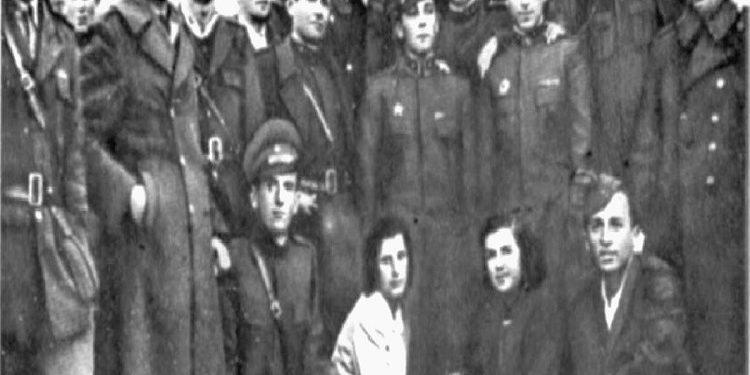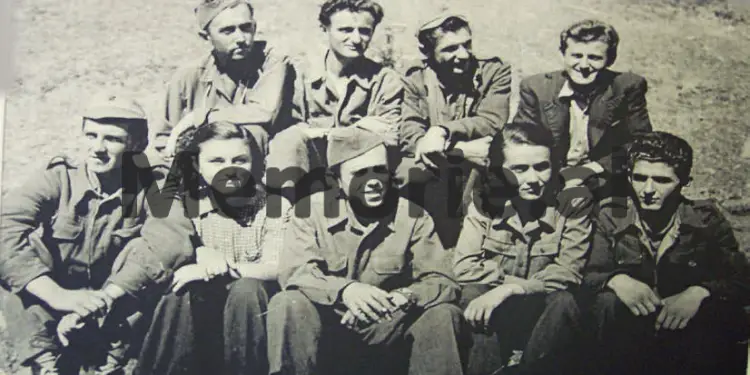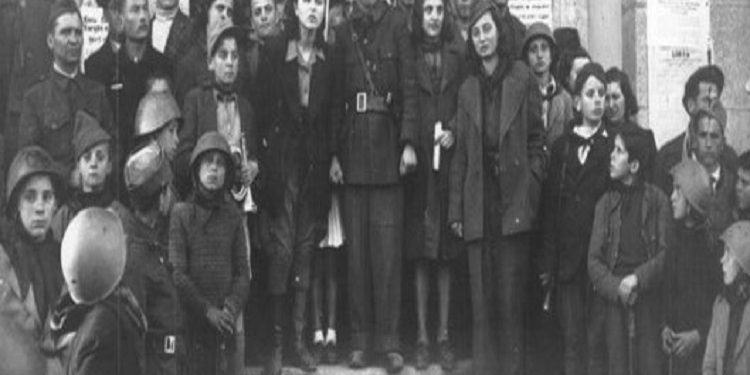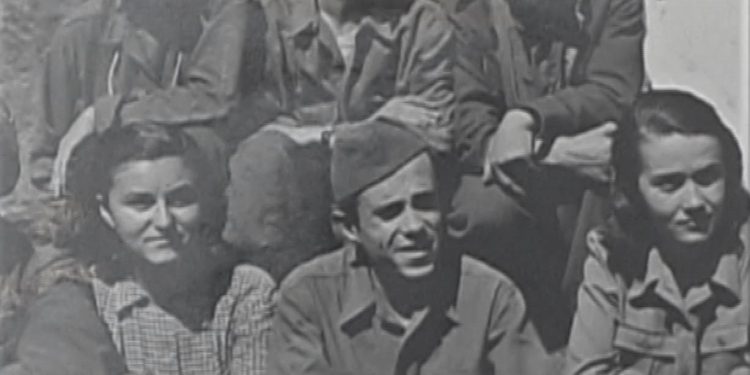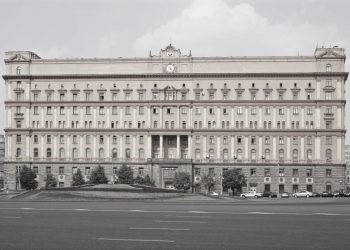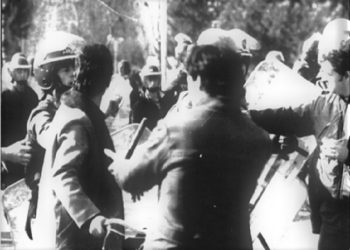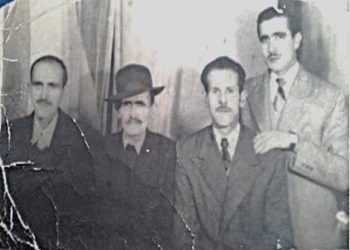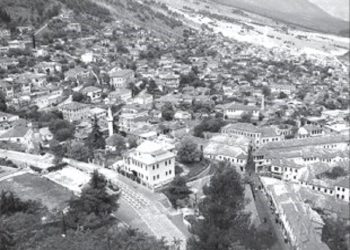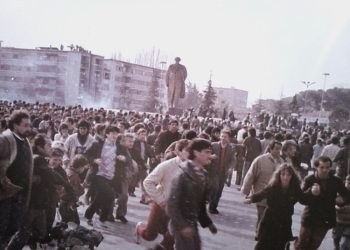From Hila Lushaku
Memorie.al / Maqo Çomo was born on March 14, 1922, in the village of Hoçisht, Bilisht (Devoll). When he was 5 years old, his father emigrated abroad, first to Argentina in 1927, later to America, where he spent his entire life. Maqo has not communicated with his father since 1939. He completed his primary education, 5th grade, in his hometown, in Hoçisht. Raised an orphan (fatherless), he was forced to start work at an early age. When he was a minor, he performed various jobs, mainly as a pastor in his hometown, while later he wandered in several districts of the country, performing more difficult jobs. Until August 1936, he worked in Thimi Adham’s store; in 1937, he worked as a coal miner in the Mamurras forest; then, in the period April 1938 – April 1942, he worked in the factory of Skënder Pojan, in Durrës.
After this year, Maqo Çomo was appointed an employee of the Consumer Cooperative in Durrës. In 1943, he was accepted as a member of the Communist Party of Albania. It has been activated in the National Liberation Movement, mainly with agitation and propaganda, where we find the beginnings of this activity, since August 1941.
On July 24, 1942, Maqo enlisted as a partisan in Devolli’s detachment. For his activity in the National Liberation War, he was honored with the “Memorial of 1942-1943”, with Certificate no. 1154, dated November 26, 1945. In the period August 10, 1943-January 10, 1944, he was a company commissar in the “Fuat Babani” battalion.
On January 14, 1944, he was assigned to the position of deputy commissar in the “Fuat Babani” battalion, where he stayed until June 16, 1944. On June 16, 1944, he was appointed deputy battalion commissar in the XV Partisan Assault Brigade, while on the 7 November 1944, he was assigned to the post of commissar of this Brigade, in the First Assault Division. On January 24, 1945, he was appointed to the position of member of the political section in Division III, where he served until March 15, 1945.
Subsequently, he was appointed and worked as the head of the “Political Section”, Division III, where he stayed until April 16, 1945. After 1945, he insisted on getting an education and completed 3rd grade of high school. From April 16, 1945, to April 10, 1946, Maqo served as deputy commissioner of the People’s Protection Division.
He was first promoted to first class captain, on 27.03.1946, by the Minister of National Defense, Colonel-General Enver Hoxha. In this case, there is the assessment: “Old element in the army.” He is kind to superiors and inferiors. He has no military skills, his authority in the work assigned to him is sufficient. His individual life is not regular, for this reason he neglects it even at work, not giving it the proper importance. He is smart, he understands things well. There are opportunities for development. He lacks goodwill.”
In 1946, he was evaluated again: “Since the beginning of the people’s resistance against the occupier, he has contributed to the organization and mobilization of the masses, he has shown himself to be a good leader in the war. Throughout the war against the occupier, whether against the traitors, he stood with his weapon in hand and did not compromise.
He has led his department successfully; we do not know of any defeats of his department. Since since the liberation of Albania and until four months ago, Comrade Maqo has been separated from the offensive forces, as he was in the People’s Protection Division, he has no knowledge of the military regulations and problems that arise in his sector.
However, within this time that he has in the Division, he has tried to orientate himself. He benefited well from the Division’s weapons training course. He was able to take advantage of the good use of weapons. During this time that he has commanded the forces, he has shown himself to be alive and made firm decisions and has not been disoriented. It is an experienced cadre.
Has good behavior with superiors and inferiors. It is elevated and clear politically. He is a good organizer, if he wants, he can give more, especially if he were a little more active and interested in all the problems of his sector. He deserves the job and the rank he has.”
In the period April 10, 1946-September 17, 1946, he was in the position of “cadre instructor”, in the People’s Protection Division. After September 17, 1946 until November 25, 1947, he was in the position of “cadre instructor” of the Fifth Infantry Division in Gjirokastër. In June 1947, he received the assessment: “Working element and related to work, he likes military life and in the courses that have been developed at the Division, he has shown interest and if he had the opportunity to continue them without absences, he would benefit a lot. He has political leadership capacity, as he is mature, experienced and old in the political sector.
He knows little about military art, and this is not because he did not want to study, but because of his function as a member of the Division’s section, he is forced to stay in the wards, so he remains detached from combat preparations. He doesn’t know weapons very well, he knows infantry weapons better. He is decisive in his thoughts, quick in his decisions, in critical situations he orients himself and makes quick decisions.
He is interested in his political rise, he has benefited after taking an active part in political work. He went to school consistently and came out almost first, out of all the officers in his class. His manners are very good, with superiors and inferiors. He has love for the cadre, he behaves well with the people, he is tough and fights against the enemies of the people.
His health condition is good. He is good at organizing and advancing the sector he is in, he has the capacity for greater tasks, he is more responsive to the political sector. He has not shown any signs of dissatisfaction with his rank and position, although he was a Division Commissioner before.”
On November 25, 1947, he was appointed “head of the Recruiting Offices section” in the Political Directorate, holding this post until April 30, 1948, when he moved to the function of “instructor” in the Political Directorate.
He remained in this position until December 13, 1948. On December 13, 1948, he was promoted to the position of “commissioner of the “Enver” People’s Protection Division, but he did not stay in this position for long, after September 5, 1949, he was promoted to the position of “chief of the Organization Branch”, of the Political Directorate of the Army.
In February 1951, he was appointed head of the Political Branch of the Ministry of Internal Affairs. In the period March 1, 1951-March 30, 1952, he was appointed to the position of Deputy Minister of Internal Affairs, being at the same time General Director of the People’s Police.
In December 1951, he was punished by Mehmet Shehu, with; serious remark with a note in the biography, “for bad moral behavior incompatible with the function as Assistant Minister of Internal Affairs and as a Party Member”. On March 30, 1952, there is the assessment: “Born in 1922, in Hoçisht village of Korçë district, he comes from a poor peasant class…!
He finished 5th grade in his village. His father is in America, as a worker, having fled since 1927. He took an active part in the National Liberation War, since August 1941, in Durrës, distributing tracts under the leadership of comrade Ndoc Mazi. He became a party member on March 7, 1943.
He joined the National Liberation Army in July 1943, in the Devolli detachment, voluntarily. Having these responsibilities during the War…cited above in this biography, now Assistant Minister of Internal Affairs.
He has been honored with medals and orders, including: “Liberation Medal”, “Commemoration Medal”, “Partisan Star Medal of Class III”, “Partisan Star Medal of Class II”, “Order of Valor”, “Medal of Valor” “, “Order of Military Service”, “Order of the Flag”. In 1952-1953, he held the position of “Minister of State Control”.
In 1953, he was released from the above position and was appointed “Deputy Minister of Gatherings”. On July 20, 1954, he was appointed Minister of Agriculture, a position he held until January 11, 1960. (The data cited above, about Maqo Çomo, were extracted from the Archive of the Ministry of the Interior, the “Maqo Çomo” Staff File).
In 1955, he married Liri Belishova, separating from his wife Parka, with whom he had daughters Tatiana and Mira. It seems that the second marriage brought him consolidation in the previous post and a better political career. In the period 1954-1961, he was elected deputy of the People’s Assembly. On November 1, 1960, he was released by the plenum of the Central Committee of the ALP.
By decree no. 3173, dated 1.9.1960 “On a change in the government”, the newspaper “Voice of the People” announced: “1- Maqo Çomo should be dismissed from the position of Minister of Agriculture, for incompetence in the implementation of the duties assigned to him. 2 – Peti Shamblli to be appointed Minister of Agriculture”. His release from office was similar to the political punishment of his wife, Liri Belishova.
Remembering this event, his wife, Mrs. Liri Belishova, after 1990, said: “Initially, I was sent to work as a principal at the 7-year-old school ‘Hasan Vogli’, in Tirana. Then they also expelled my husband from the Central Committee and removed him as Minister of Agriculture, allegedly not for political reasons, but for ‘incompetence’!
Our family was removed from Tirana, on November 9, 1960, they sent us to the “Muzo Asqeriu” farm, near Gjirokastra. Me as the head teacher and him as the farm director. There we were expelled from the Party, after two months or so, and we were interned in Kuç, Vlora. From Kuçi they took us to Progonat, they took him and took him to Zvrnec, and I lived there for 10 years. After 10 years, they moved me to Cërrik, where I stayed for 21 years”.
According to the documents of that time, it turns out that Maqo Çomo was appointed director of the Agricultural Enterprise in Goranxi of Gjirokastra and from here, for a year, he was exiled to Kuç and then to Progonat. In the years 1962-1967, he was interned in the Zvrnec camp, in Vlora, separating him from his family. There he found; Gjin Markun, Bardhyl Belishova, Kasem Trebeshina, Foto Proka, Kadri Hoxha, Zef Malaj, Pëllumb Dishnica, Iliaz Ahmet, Filip Jakova, Agron Çoratin, Xhavit Qesjen, Xhaferr Vokshin, Spiro Gjokë, Kristo Budo, etc.
Some of them he had later even while serving his sentence, in the Burrel prison. In 1967, considered dangerous for the regime, he was arrested and sentenced to 20 years in prison by the communist regime (1967-1987). He spent a difficult life in prison, but he did not submit.
Maqo’s conviction brought suffering and stress to his children
His daughter, Drita, fell seriously ill and passed away in the prime of her youth, when she should have been enjoying life, youth, when she was finishing high school (At the time she was admitted to the Oncology Hospital, in Tirana, she wrote painful memories, from the diary of her father, the unbreakable Maqon, such as this painful note:
“Tuesday 13.02.1979. Yesterday we were with mom, dad and uncle. We were notified on Saturday. On Sunday I went to Elbasan, to buy food, I left with the morning bus and returned with the 11.30. I didn’t go from my uncle at all. I spent the part of my free time in the library. We left for Burrel with ‘Gaz’, at 6 in the morning. We were accompanied by two bags. The road was long and boring.
It was stuffiness, mom was taken by the car and the volley. And I was trying to remember what things I had wanted to tell them all this time. Yes, we were only allowed to meet uncle for 10 minutes and dad for half an hour. This was communicated to us at the last moment, it was something unexpected and opinions were completely scattered. Everything we said, it seemed to me that it was not what was needed. As if they were wasting our time.
The minutes passed quickly, very quickly, and in the end, I had the impression that we hadn’t spoken anything, we hadn’t even kissed each other enough. Then I felt like a child who was promised a toy and lied to. Again, a long and tiring road. A short interval between two long, long fatigues. This is the father in my life. My good, strong father.
Now everything seems foreign to me, meaningless, almost ridiculous. People on the street, children playing, buses of workers, boys smoking cigarettes and dating girls. Newspapers, words…! And my father there. For 18 years in a row. My father. You say days will pass and I will go back to my usual life?! In my small, empty worries, in my ridiculous sufferings. There are moments when I am ashamed of myself”.)
After being released from prison, in 1987, Maqo joined his family in Cërrik, where he stayed in exile for four years, until 1991. In June 1995, there was a trial in the Constitutional Court, with open doors, case no. 8. Act, with object: To declare unconstitutional the law no. 7748, dated 29.7.1993, “On the status of ex-convicts and political persecuted, from the communist system”, as well as in particular; “Decision of the Council of Ministers no. 454”, dated 12.09.1994, “On the criteria for determining the persons of the high communist nomenclature, due to the status of ex-convicts and political persecuted”.
The court rejected the lawsuit and did not grant Maqo Çoma the right. The fatigue of 30 years in prisons and exiles, away from the family of a free life, the shocking blows of unimaginable stress and disappointment, the soul poisoned like bile, extinguished the invincible Maqo Çoma at the age of 76. Those who have known the young Maqo do not hesitate to express considerations for the charming ex-boyfriend, with fascinating sky-blue eyes, with an elegant stature, over 1.80 m tall and loved by everyone. On January 23, 1998, his eyes were closed forever, in Tirana.
A friend of the Çomo family, sharing the experience of knowing Maqo and Lirisa, when they went for a condolence visit for the dead, portrayed Maqo Çomo beautifully: “…I was 10 or 11 years old, when my grandmother was happy when she came to our house finally, for lunch, in Pogradec, her first cousin, Maqo Çomo. He was with his wife, Liri Berishova. The situation at home was almost ceremonial, but also very emotional. I didn’t really know anything, I studied as a child. My grandfather had just died, having voted for the last time, and for the first time freely, for the Democratic Party.
The visit of those two was in commemoration of him. Maqo had spent 30 years in prison, his wife and children had gone through a real hell. Drita, their 23-year-old daughter, had died alone, her mother had taken away so much that cannot be described, and still I can’t get out of my memory Maqo Çomo, old, beautiful, dignified, noble, thoughtful, silent and so dear to my grandmother. Something had kept him alive and sober: The awareness that he was not alone…! But it was dissolved, 3 years later, in the 90s, although it had survived 30 years in a row in the prisons of the most ferocious animal regime, perhaps in the whole world”! Memorie.al




